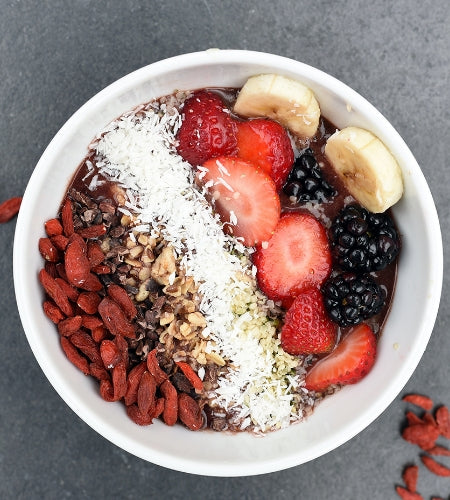Understanding the different types and sources of collagen
When it comes to choosing a collagen product, you have choices. Hurray for choice! It can be hard to choose the best product for your health if you also have a choice in the types of collagen available to you, but you're not sure which will be best for you or what each type of collagen actually does.
We thought we'd break it down for you, and help you understand why we choose to use Marine Collagen for our products that target hair, skin and nail health.
The three main types of collagen used for supplements are Type I, II and III
Type I Collagen - 100% found in Marine (fish) Collagen and also present in smaller amounts in Porcine (pig) Collagen and some forms of Bovine (cattle) Collagen.
Type I makes up 75-90% of the collagen found in your skin, hair, nails, organs, bone, ligaments. For skin and beauty applications Type I Collagen is considered to be the best. Dermatology research with oral supplementation of collagen has shown that when Type I (overall body) Collagen is increased, there are visible results in the appearance of skin.
Type II Collagen - Chicken Collagen and Bovine Collagen if from cartilage.
Type II Collagen makes up the fluids and function of the cartilage and joints. Its main supplemental purpose is for the treatment of joint pain and arthritic conditions, as well as for a dietary protein source. Type II Collagen makes up 10% of the total collagen in the body and 50-60% of the protein found specifically in our cartilage.
Type III Collagen - Found with Type I in Porcine (pig) Collagen and Bovine (cattle) Collagen if from bovine hide.
Type III Collagen is the second most abundant collagen in tissues; most commonly in tissues with elastic properties such as skin, lungs, intestinal walls and walls of blood vessels. It’s also found in fibrous protein in bone, cartilage, dentin (a strengthening coating on teeth), tendons, and other connective tissues.
The pros and cons of the different sources of these types of collagen
Marine Collagen (fish)
PROS:
- Marine Collagen peptides are considered to be superior at increasing overall body collagen (Type 1) and supporting skin, hair, nail, and bone quality.
- Marine Collagen is absorbed up to 1.5 times more efficiently into the body, meaning it has superior bioavailability over bovine or porcine collagen due to its low molecular weight it’s absorbed more easily and enters the bloodstream more rapidly.
- Marine Collagen peptides have gained popularity in nutraceutical products due to their similarity to the human collagen structure
CONS:
- Marine Collagen peptides are generally more expensive
- Not suitable for those that have an allergy to fish
Bovine Collagen (cattle)
PROS:
- Bovine collagen peptides are generally easier to source, and are incorporated into a wide variety of collagen supplements, largely due to the high accessibility of bovine materials.
- Because Bovine Collagen contains Type III and some Type I Collagen (unless from cartilage making it Type II), it can be effective for support of skin, hair and nails.
- Bovine collagen from cartilage can be highly effective for joint pain and recovery.
CONS:
- Not considered as effective as Marine Collagen peptides in raising overall body collagen levels for skin, hair and nails.
- Should always be from free-range, grass-fed, hormone-free cows. This can make it more expensive too.
Porcine (pig) Collagen
PROS:
- Porcine Collagen peptides are usually lower cost, and are incorporated into a wide variety of collagen supplements, largely due to the high accessibility of porcine materials.
- Like Bovine Collagen, Porcine Collagen contains Type III and some Type I collagen, so it can be effective for support of hair, skin and nails.
CONS:
- Not considered as effective as Marine Collagen peptides in raising overall body collagen levels.
- Not thought to be as easily absorbed as Marine Collagen.
- Should always come from free-range, hormone-free pig material, which will make it more expensive too.
Chicken/Bovine Collagen (if from cartilage) Type II collagen
PROS:
- Chicken collagen peptides are considered to be most effective for supporting cartilage in the body.
- Studied for its role in supporting mobility issues, and reducing pain associated with arthritic conditions.
CONS:
- Not considered an ingredient for reducing the visible effects of ageing in skin.
- The use of collagen supplements has been well studied, and continues to be studied as the rise in popularity of products containing collagen grows.
At Jeuneora we choose to use only Marine Collagen Type I in our Renew+, AquaGlow, and Hair Skin Nails Capsules when it comes to supporting skin appearance, and the health of hair, nails and gut health.
We hope that the information in this post helps inform you about the different types of collagen available, and the purpose of each of these different types.









